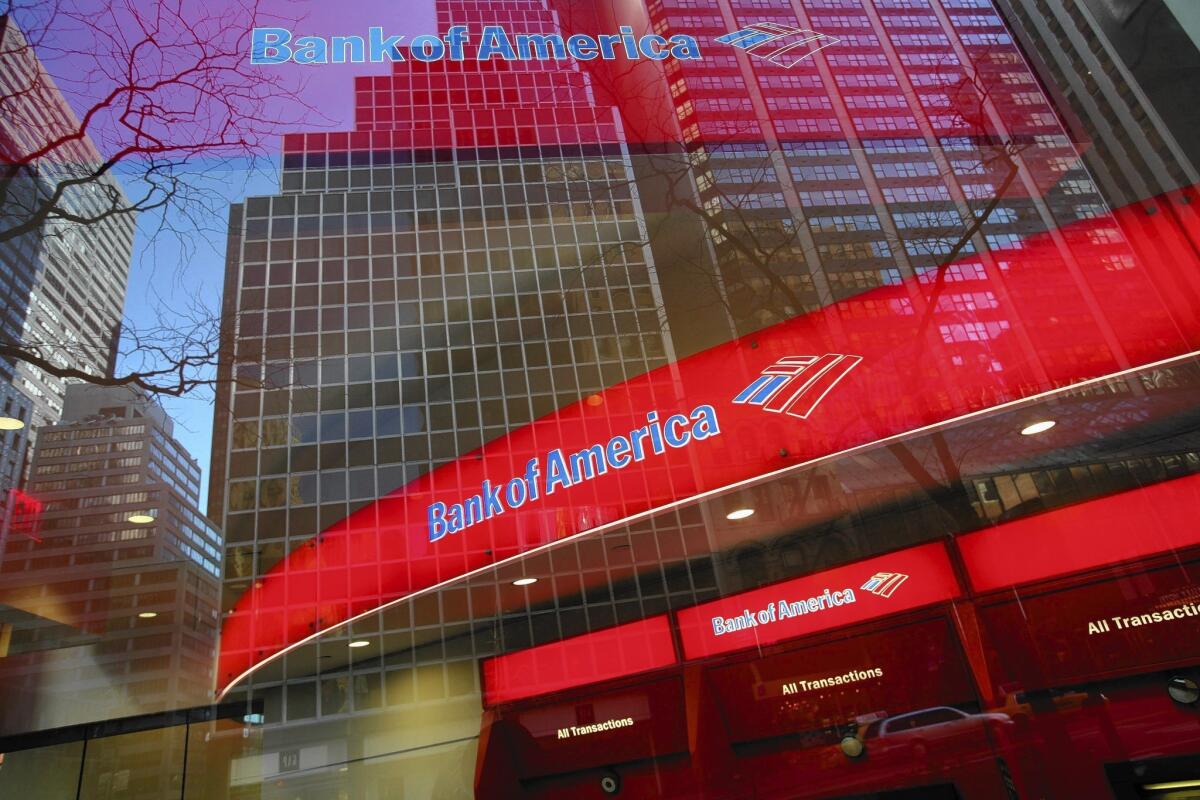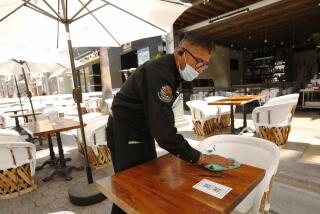Federal program for small businesses that are hurt by coronavirus is slowed by snags

- Share via
WASHINGTON — Small business owners across the country woke up early Friday morning, desperate to be among the first to apply for a $349-billion federal relief program — the government’s largest effort to date to keep Americans employed through the pandemic. Instead, they confronted problems, delays and even rejections.
Some of the nation’s largest banks said they weren’t ready to participate, having received information too late from the Treasury Department. Others were overwhelmed, hit with a deluge of applications from millions of business owners trying to stay solvent amid the economic crisis caused by coronavirus-related shutdowns.
Tom Straus, the owner of Straus Carpets in Oakland, said that by late Friday he had called or visited six banks, some large, some small. Although he had already filled out the loan application, no banks were prepared to accept it.
“Even though the plan is supposed to be rolled out, I’ve been not just unsuccessful — I’ve been frustrated at every turn,” he said.
In the meantime, he’s dipping into his personal savings to continue to pay his 21 employees.
The loan program, known as the Paycheck Protection Program, was assembled by the Treasury Department and the Small Business Administration, with funding from the $2-trillion relief package agreed to by Congress and President Trump last week. It depends on major banks and other lenders to provide small businesses with forgivable loans, up to $10 million, to cover their payroll and rent.
But in the rush to get the program up and running, there was widespread confusion about the terms of the loans and what information borrowers must give to obtain them. On Thursday, some banks had warned their customers to expect delays.
JPMorgan Chase emailed small business customers to say it would not be ready to accept applications on Friday. A spokesman for Citi said it was still reviewing the administration’s guidance and would “begin accepting online loan applications as soon as possible.” And Wells Fargo, which hadn’t made an online application available by Friday evening, told customers on its website to “check back often.”
The president of the Western Bankers Assn., Steve Andrews, had issued a cautionary statement on Thursday, saying, “Less than 24 hours before these loans are to be made available, our banks are still awaiting important guidance from the U.S. Treasury and Small Business Administration.”
By Friday evening, however, Trump boasted at a news conference that on Day 1 of the program, the government has processed $3.5 billion in loans. “That’s way ahead of schedule,” he said.
Small banks seemed to be shouldering most of the work while large ones struggled. Shortly after noon, Treasury Secretary Steven T. Mnuchin tweeted that more than $875 million in loans had been processed “almost all from community banks.”
The program requires that small businesses spend three-quarters of the loan amount to keep their workers employed, or the loan will not be forgiven. If they must repay their loans and fail to do so, their lending banks can recoup any losses from the government, which is guaranteeing the loans’ value.
The loans are meant to be extremely favorable to borrowers. Small businesses don’t have to make payments for six months and the interest rates are low — so low, in fact, that after complaints from community banks, the government raised the rate from 0.5% to 1%.
Bank of America was one of the few large financial institutions accepting applications on Friday morning, but its policy of taking applications first from customers with existing loans meant that some of its longtime account holders were shut out.
Mark Comon, owner of Paul’s Photo in Torrance, said he had been banking with Bank of America for 30 years. Yet when he logged onto the bank’s website early in the morning, he was told he couldn’t apply for a loan because he’d never borrowed money from Bank of America before.
Before the pandemic struck, Comon’s camera store had 18 employees and did about $10,000 worth of business on a normal day. Now that his doors are closed and he’s relying primarily on phone and online orders, he’s had to lay off all but five people. On Monday, he made $111.
Comon said he needed a loan so he could do exactly what members of Congress and the president have said they want small business owners like him to do — hire back all of his employees. Now he’s not sure if he’ll be able to pay rent.
“We were looking forward to having this loan so we could start to rebuild the business and survive,” he said. “Being denied access to the money is a death sentence for our small business.”
In an interview on CNBC, Bank of America Chief Executive Brian Moynihan said the company was giving priority to current borrowers because it could process their applications quickly. “Then our second priority will be the customers who have the core operating accounting with us,” he said.
By late Friday, a bank spokesman said it had received 85,000 applications requesting $22 billion.
One way for banks to protect themselves from risk is by favoring businesses that have existing loans or credit cards, said Rodney Ramcharan, professor of finance at USC’s Marshall School of Business. They have already combed through these borrowers’ finances, he said, making it safer to lend.
“In a situation like this where there’s a lot of uncertainty about what’s coming down the pike,” Ramcharan said, “I think most banks are going to first extend credit to the businesses that they know.”
That leaves out customers such as Billy Silverman, co-owner of the restaurant Salazar in Los Angeles’ Frogtown neighborhood. Silverman said he contacted Bank of America representatives this past week about the loan process, and they assured him that the requirements for approval would be minimal.
“I applied as soon as their site went live,” he said. But Silverman soon received an email saying he was not eligible because he did not “have an existing small business relationship” with Bank of America.
“No one I’d spoken with said that would be the case, at any point,” he said. “We’ve been fortunate to not have to take loans out before, and now it’s like we’re being punished for it.”
Silverman had sought to borrow the maximum loan amount backed by the Treasury — two and a half times his restaurant’s monthly payroll — to cover Salazar’s rent and other expenses as well. He is currently trying to get a loan from another bank.
“It’s a complete disaster right now, to put it mildly,” he said. “Nobody has a clue.”
Staff writer Garrett Snyder in Los Angeles contributed to this report.
More to Read
Get the L.A. Times Politics newsletter
Deeply reported insights into legislation, politics and policy from Sacramento, Washington and beyond. In your inbox twice per week.
You may occasionally receive promotional content from the Los Angeles Times.












